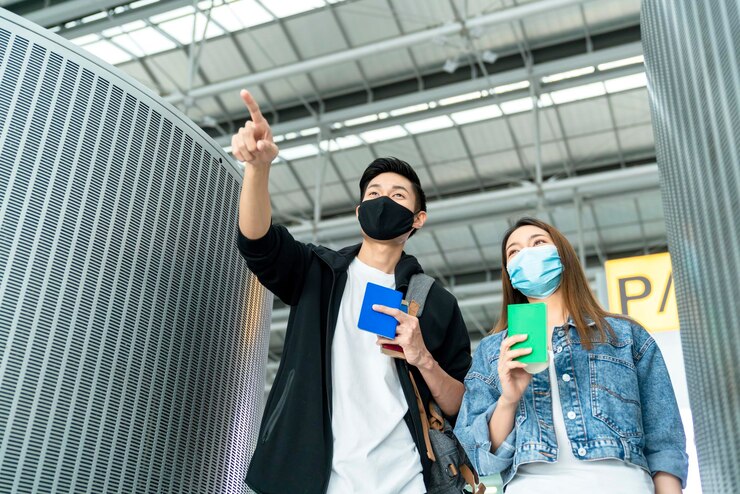Traveling abroad can be an exciting and rewarding experience, but it also comes with a set of challenges and risks. From navigating unfamiliar territories to dealing with different cultures and potential security threats, it’s essential to be well-prepared before embarking on international journeys. One crucial aspect of preparation is receiving a defensive foreign travel briefing, which equips travelers with valuable information to stay safe and make informed decisions while abroad.

In this article, we will explore the importance of defensive foreign travel briefings, what they entail, and how often individuals should receive them. We will reference information from the U.S. Department of Commerce, the National Oceanic and Atmospheric Administration (NOAA), and insights from Quora to provide a comprehensive understanding of this crucial aspect of international travel.
Defensive Foreign Travel Briefings
A defensive foreign travel briefing is a specialized program designed to educate travelers about potential risks and challenges they may encounter while abroad. These briefings are primarily aimed at government employees, diplomats, business professionals, and anyone else planning to travel internationally.
The goal is to ensure that travelers are well-prepared and can make informed decisions to safeguard their well-being during their overseas trips. The defensive foreign travel briefing covers a wide range of topics, including:
1. Security Risks: This includes information on potential security threats, political instability, terrorism, and criminal activity in the destination country.
2. Health Concerns: Travelers are informed about health risks, such as endemic diseases, vaccinations, and medical facilities available in their destination.
3. Local Laws and Customs: Understanding local laws and customs is crucial to avoid unintentional legal violations and cultural misunderstandings.
4. Safety Tips: Practical advice on personal safety, including avoiding risky areas, securing personal belongings, and using transportation safely.
5. Communication: Guidance on staying connected with authorities, embassies, and local emergency services.
6. Travel Documents: Information on visas, passports, and any required permits for the destination country.
7. Crisis Management: Preparing travelers for unexpected events like natural disasters or political upheaval.
The defensive foreign travel briefing is a comprehensive program that aims to empower travelers with the knowledge needed to mitigate risks and ensure their safety during international travel.
How Often Should You Receive a Defensive Foreign Travel Briefing?
The frequency of receiving a defensive foreign travel briefing depends on various factors, including your role, the nature of your travel, and the policies of the organization you work for. Let’s delve into these factors to determine how often you should receive these briefings:
1. Government Employees and Diplomats: For individuals in government service, especially diplomats, receiving regular defensive foreign travel briefings is standard practice. The U.S. Department of State, for instance, requires diplomats to undergo such briefings annually or when there is a significant change in the security environment of their destination.
2. Business Travelers: Employees of private companies often receive defensive foreign travel briefings on a case-by-case basis. The frequency may depend on the nature of the business, the location of the travel, and the organization’s policies. In high-risk regions or industries, briefings may be more frequent.
3. Tourists and General Travelers: Tourists and general travelers are not typically required to receive defensive foreign travel briefings. However, it is advisable to seek relevant information from government sources, travel agencies, or trusted online resources. Staying informed about the destination’s current situation is crucial for ensuring a safe and enjoyable trip.
4. Academic and Non-Profit Travel: Educational institutions and non-profit organizations that send individuals abroad for academic or humanitarian purposes may provide defensive foreign travel briefings. The frequency may vary based on the organization’s policies and the location of the travel.
5. Repeat Travelers: Even if you have traveled to a particular destination multiple times, it’s essential to stay updated. Conditions can change rapidly, and what was safe in the past may not be so in the present. Regular briefings are crucial to adapt to evolving circumstances.
Online Resources for Defensive Foreign Travel Briefings
The U.S. Department of Commerce provides a Foreign Travel Briefing Program, as indicated by the provided link. They offer a dedicated service to educate and prepare government employees and others planning to travel abroad. These briefings are tailored to the specific needs of the traveler, focusing on their destination and the purpose of their travel.
Similarly, the National Oceanic and Atmospheric Administration (NOAA) provides resources for defensive foreign travel briefings. NOAA is particularly important for individuals traveling to remote and challenging environments, such as scientists conducting research in extreme locations.
For those seeking general information and advice, websites like Quora can be valuable. Quora is a platform where individuals share their experiences and knowledge. It can offer insights into what to expect and how often to receive defensive foreign travel briefings based on the experiences of other travelers.
Incorporating Best Practices
To make the most of defensive foreign travel briefings, it’s essential to incorporate best practices into your travel plans. Here are some tips:
1. Plan Ahead: Schedule your defensive foreign travel briefing well in advance of your departure date. This allows ample time for preparation and any required actions.
2. Stay Informed: Regularly check travel advisories and updates from government agencies like the U.S. Department of State or the U.S. Centers for Disease Control and Prevention (CDC). These sources provide up-to-date information on security, health, and other relevant concerns.
3. Share Information: If you are traveling with others, share the information you receive during your defensive foreign travel briefing. It’s important that all members of your travel party are aware of potential risks and how to stay safe.
4. Emergency Contact Information: Keep emergency contact information readily accessible, including the contact details for the nearest U.S. embassy or consulate, local emergency services, and your organization’s point of contact.
5. Regular Check-Ins: If you are traveling for an extended period, make it a practice to regularly check in with someone back home. Share your itinerary, and establish a routine for communication.
6. Travel Insurance: Consider purchasing travel insurance that covers unexpected events, such as trip cancellations, medical emergencies, or evacuations. Be sure to understand the coverage and how to make claims if necessary.
7. Cultural Sensitivity: Respect local customs and traditions. Being culturally sensitive can go a long way in avoiding misunderstandings and conflicts.
8. Stay Connected: Stay connected with the local expatriate community or fellow travelers. They can provide valuable insights and support.
Conclusion
Defensive foreign travel briefings are a crucial component of international travel preparation, aimed at educating travelers about potential risks and challenges. While the frequency of receiving these briefings varies based on factors such as your role and destination, staying informed about current conditions and potential threats is essential for everyone traveling abroad.
The information provided by the U.S. Department of Commerce, the National Oceanic and Atmospheric Administration (NOAA), and online resources like Quora can be valuable in preparing for your trip. Incorporating best practices, such as planning ahead, staying informed, and sharing information with your travel party, can help ensure a safe and enjoyable international travel experience. Remember that safety is paramount, and being prepared is the first step in making your journey a success.



